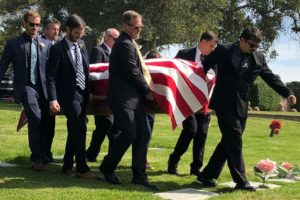3 years ago, Dr. John Coe of Biola’s Institute for Spiritual Formation preached at a Biola University chapel and it rocked my world. He preached on something that I have become all too familiar with: the dark night of the soul. Now it is true that God is always present. This new covenant reality, bought by the blood of Christ, that God indwells us necessarily brings us to another truth: that he will never leave us and nothing can separate us from his love. But if these two things are true, then what about the times when he is most distant? What about the times when we can’t feel him? Has he left? Is it because we have been unfaithful?
These four questions have been rooted in my brain for the past four years. The desert that I am in, is relentless. If you would’ve looked in a typical journal entry of mine from high school, it may have started with “O God, I praise you,”so filled with the joy and presence of God was I. An entry from my first two years at Biola may have started with, “O God, arise and demonstrate your power,” because I was so filled with a passion and desire to see people come to know the truth. For the past couple years, it has usually started with, “O God, do you still love me?” These three examples, to me, illustrate the growth and decline of my spiritual walk through the years. And I have usually thought that it was my fault, and thus my responsibility to feel his presence again.
However, when Dr. Coe preached this sermon, it gave me some kind of framework and hope with which to interpret the dark night that I had been experiencing. He goes on to explain that this “dark night” is not new, not my fault, and not bad. I didn’t believe it when I first heard it. Theologians and writers throughout church history, after years of discipleship, have recognized this pattern in many believers. Apparently, sometime after conversion, an incredible season of experiencing God’s presence ensues. However long it may last, the believer is actively enjoying God’s presence: a time of Consolation. Where the believer feels and desires God the most. But at some point, a plateau begins where the enjoyment and excitement has decreased. aka Boredom. Eventually, the believer begins to experience the felt absence of God. His absence is more real than his presence: a time of Desolation. And this pattern is common with new believers, mature believers and everyone in between. Regardless of how mature one is in the Lord, it seems that these three seasons are common to all. Maturity and consolation are not necessarily directly proportional to one another.
But there is good news.
According to Dr. John Coe,
“It must be then that spiritual feelings of Consolation or Desolation do not necessarily correlate with maturity…Therefore, spiritual feelings of God’s presence, Consolation, and spiritual feelings of God’s absence, Desolation, are less the result of our actions, and they’re more the gifts of God according to his purposes.”
Contrary to popular belief, consolation is not a reward for all the spiritual work you’ve been doing.
“The gift of Consolation is this; when God knows that you need encouragement, he will give to you that consoling experience of his presence. When he knows that you need something, he will give you what the ancients called the bottle, or the breast, of spiritual pleasure….the Spirit takes us right where were at and He says I know you need a taste of me. Taste and see how good this is.”
So then what is the gift of Desolation? And why is it a gift?
The gift of Desolation is a time for God to take away that consoling presence, to take away the bottle of spiritual pleasure, in order to let you see what is really going on in your heart. Therefore, all these times of worship or of hearing a sermon may be less a time of comfort and more of a mirror to your own soul. He wants to make you see what your heart is really attached to.
And what is the point of this? God wants to make your heart his home.
In this time, when God has removed that comforting experience, He is continually asking us, “Do you want the pleasure of knowing me? Or do you want me?
I’m sure at least some of you can relate to this. When I first heard this sermon, I breathed a deep sigh of bittersweet relief. Relief because it was encouraging to know that I am not the only one, and that perhaps God is actually working when I feel like he is not. Bittersweet because it has been relentless and dry and extremely depressing. To be sure, there have been a few times where God has met me. And I have wept at those times because I actually felt like maybe God still cared about me. But for the most part, I feel like I am barely holding on. I have turned to other things to try and fill that void, whether it is comedy, music, or relationships. But those things are fleeting at best, disappointing at worst. A friend who was going through something similar once asked me,
“So how are you able to still believe? How are you able to look around you and still hold on?”
All I could say was, “Because God has been faithful to me in the past.”
He then asked me, “And that’s enough for you?”
“It has to be”
I can’t help but think of the prophets in the Old Testament who had to keep reminding Israel of all that God had done for them in the past when they would turn aside to worthless idols. All of them had to point back to how God had delivered them from bondage to show them that He is still their God. And that is what I look to when I cannot feel or see Him in this season in my life. He has been faithful, he is faithful, and by definition, will continue to be faithful, even when I am not. Those few times in this season, where he has provided that consoling experience have been incredibly sweet. He HAS met me at those times where I have been at my lowest. And it is his preserving grace that carries me everyday when I just don’t desire Him, when I cannot feel Him.
I am an EMT and one day at work, my partner and I were discussing how both of us have been discouraged lately. He happened to be a Christian and shared that he used to be Muslim but 5 years ago, God saved him. Well, later in the day, we had a short 15 minute non-emergency transport. I was driving the ambulance and he was attending to the patient in the back. They began to discuss Islam and Christianity because our patient happened to be Muslim. Naturally, I was hanging on to every word of this conversation. My partner shared about God’s incredible love for the world and how that is one thing that led him out of Islam. Our patient shared that one thing that has frustrated him is the hate that he has seen among his people and that saddened him because he loves people. He then said, “Well, then I want to become a Christian.” My partner prayed with him and it was as simple as that. We took him to his room and said goodbye. My partner then said, “I wish I had a Bible to give to him.” And for some reason, I had recently placed a Bible in my backpack just in case I felt the urge to read it at work. And just in case I wanted to do something about my walk with God. Which to be honest, wasn’t happening very often. But in this tiny moment of God’s faithfulness, He allowed my partner and I to be faithful even when we were not doing our best. I can only hope that God has used this seed and his word in this man’s life to produce something beautiful.
Marisa Casias graduated from Biola University with a B.S. degree in Human Biology. She currently lives in Norwalk, CA and works full-time as an EMT in Orange County. She is currently applying to nursing schools around Southern CA. Her spare time is mostly spent going to concerts and comedy shows and learning how to cook well.





3 Comments
Leave your reply.